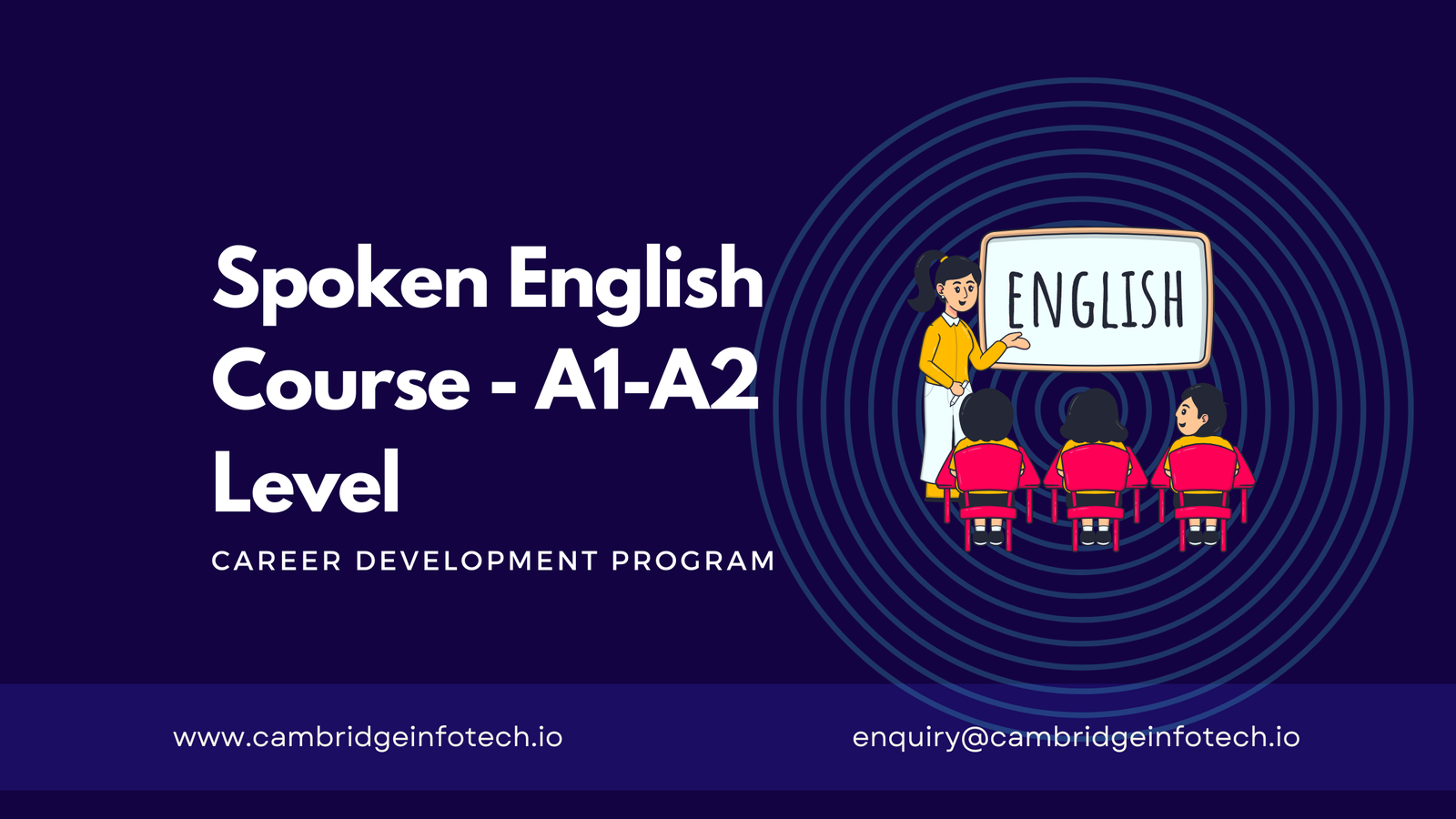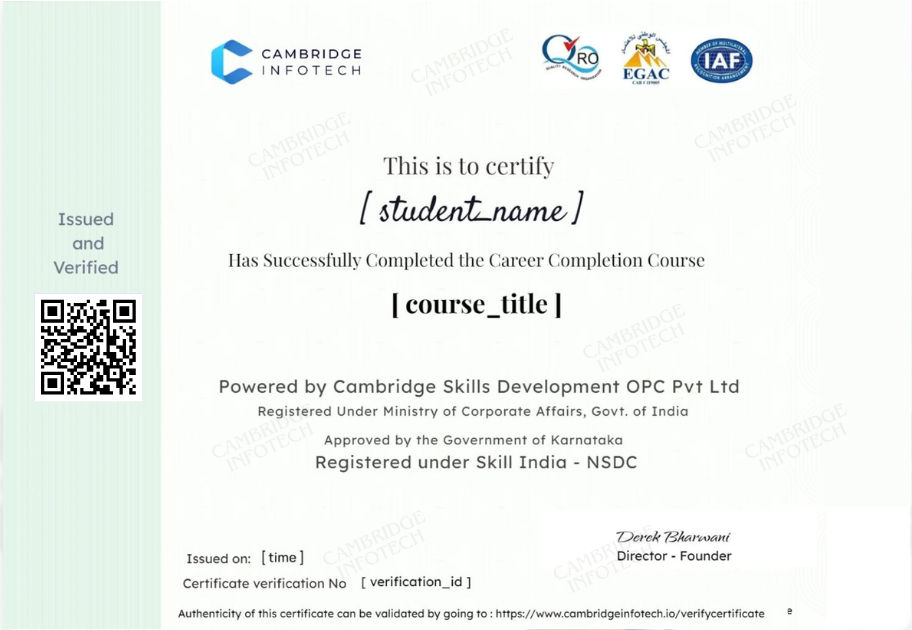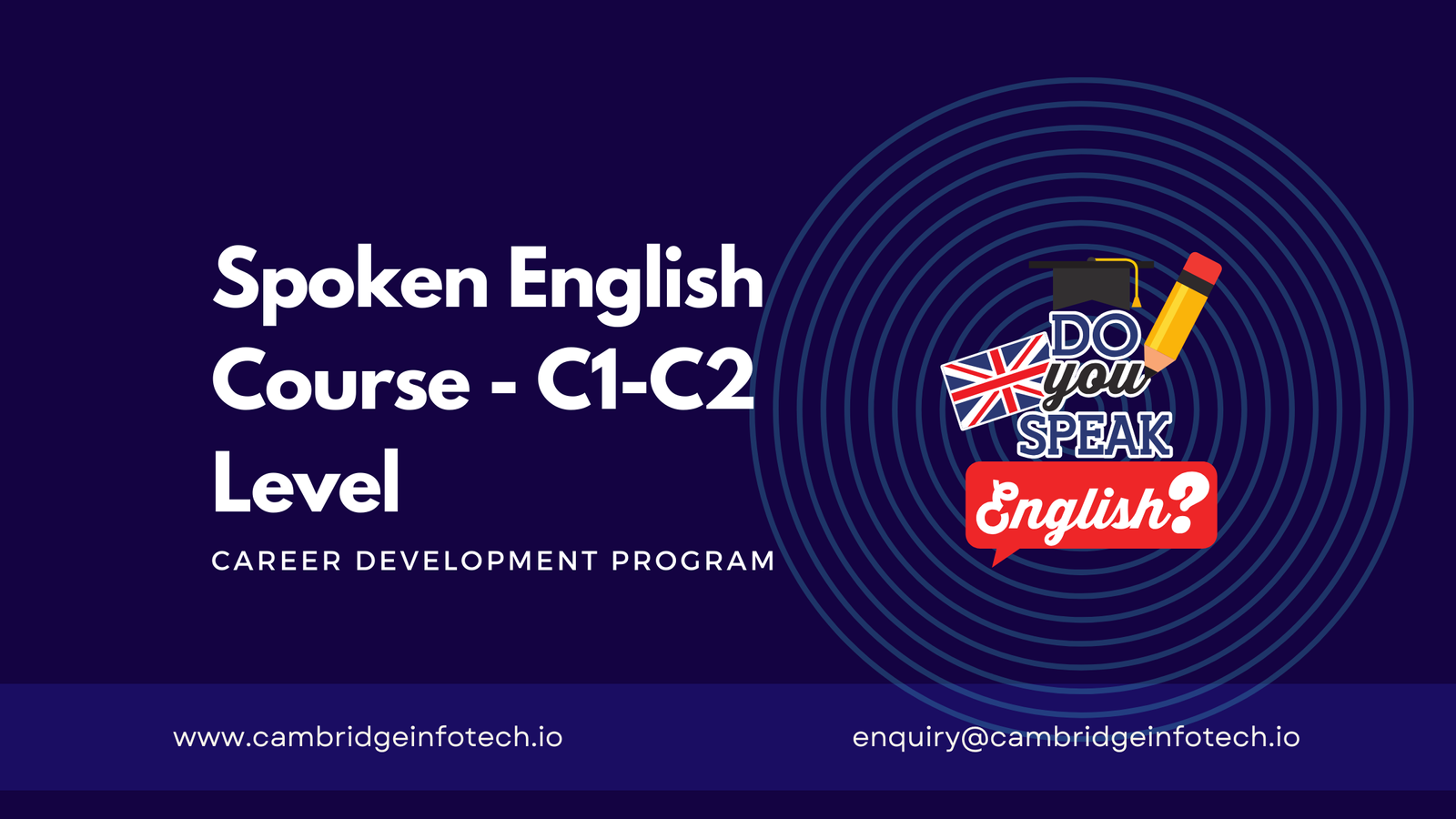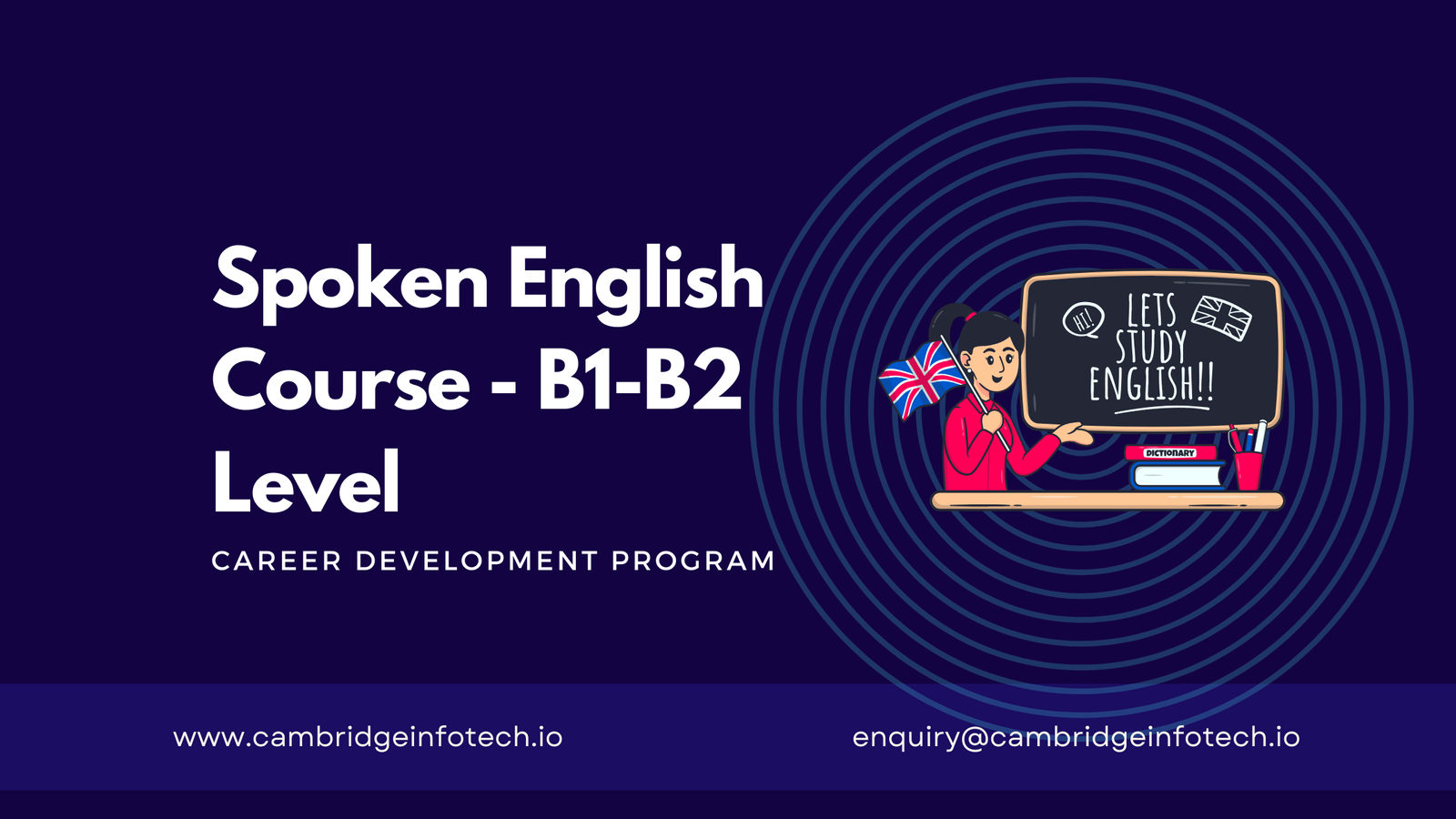In today’s globalized world, strong English communication skills are no longer optional—they are essential. Whether you’re a student preparing for higher studies, a professional aiming for career growth, or a newcomer in Bangalore struggling with everyday conversations, mastering basic spoken English (A1/A2 level) can open doors to better opportunities. At Cambridge Infotech, we offer the best Spoken English Course in Bangalore, specifically designed for beginners who want to speak confidently in real-life situations. Our CEFR-aligned curriculum, expert trainers, and interactive classes ensure that you progress from forming simple sentences (A1) to holding daily conversations (A2) in just 8 weeks.
Bangalore, India’s IT and startup hub, demands strong communication skills, even for entry-level jobs. Many learners hesitate to speak English due to fear of mistakes, lack of practice, or unstructured learning methods. Our Spoken English coaching in Bangalore solves these challenges with a 100% practical approach—role-plays, group discussions, and personalized feedback. Unlike generic language courses, we focus on real-world scenarios like interviews, workplace interactions, and social conversations, making learning relevant and engaging.
Wondering if this course is right for you? If you’re someone who:
Struggles with basic English grammar and sentence formation,
Needs to improve pronunciation and fluency for jobs or academics,
Wants a recognized certification to boost your resume,
Prefers small batches with individual attention, then our A1/A2 Spoken English Training in Bangalore is the perfect fit.
We’ve helped 1,200+ learners in Bangalore gain confidence in English, with many securing jobs in top companies. Our affordable fees, flexible batches (weekdays/weekends), and industry-recognized certification make us a top choice among spoken English classes near you. Ready to transform your communication skills? Join our next batch or book a free demo class today!
What is Spoken English A1 & A2 Level? (Beginner’s Guide to CEFR Standards)
If you’re new to learning English, you’ve likely come across terms like A1 or A2 level—but what do they really mean? These classifications are part of the Common European Framework of Reference for Languages (CEFR), a globally recognized system that measures language proficiency. At Cambridge Infotech, we structure our Spoken English Course in Bangalore around these levels to ensure systematic and effective learning.
A1 Level (Beginner) – Breakthrough or Beginner Stage
At the A1 level, you are an absolute beginner who can:
Understand and use basic everyday expressions (e.g., greetings, introductions).
Form simple sentences (e.g., “My name is…”, “I live in Bangalore”).
Ask and answer basic personal questions (e.g., age, nationality).
Use essential vocabulary (numbers, days, family terms).
Example Situations:
Ordering food at a café.
Asking for directions in Bangalore (e.g., Where is MG Road?).
Introducing yourself in a job interview.
(This level is ideal for those who struggle to construct even basic sentences.)
A2 Level (Elementary) – Waystage or Pre-Intermediate
Once you progress to A2, you can handle slightly more complex conversations, such as:
Discussing routine tasks (e.g., daily schedule, work routines).
Describing personal background (e.g., education, hobbies).
Understanding short, simple texts (emails, notices).
Engaging in basic social interactions (e.g., shopping, travel).
Example Situations:
Explaining your job role in simple terms.
Booking a cab or hotel in English.
Writing a short email to a colleague.
(A2 learners can communicate in familiar contexts but still make grammatical errors.)
How This Spoken English Course (A1/A2 Level) Can Boost Your Career in Bangalore
In a competitive job market like Bangalore, strong spoken English skills can be the difference between stagnation and career growth. Whether you’re a fresher, working professional, or career switcher, mastering A1/A2 level English opens doors to better opportunities. Here’s how this course can transform your career trajectory:
Unlock Entry-Level Job Opportunities
Many BPO, retail, hospitality, and customer service jobs in Bangalore require basic English (A2 level). With this course, you can:
Handle customer interactions confidently (e.g., call center jobs).
Work in retail stores, hotels, or restaurants (e.g., explaining products, taking orders).
Apply for delivery/ride-hailing jobs (e.g., Uber, Swiggy, Zomato).
Fact: 70% of entry-level job rejections happen due to poor English communication.
Increase Your Salary Potential
Employees with basic English fluency earn 15–30% more than those who don’t.
Example: A store attendant who speaks English can get promoted to cashier/supervisor with a higher salary.
BPO agents with clear English move from non-voice to voice support, doubling earnings.
Stand Out in Interviews
Even if you have technical skills, poor English can ruin your interview. This course helps you:
✔ Introduce yourself without hesitation.
✔ Answer questions like Tell me about yourself” clearly.
✔ Ask smart questions (e.g., What are the growth opportunities?).
Bangalore Reality: Many IT/tech companies filter out candidates in the first round if they can’t communicate in English.
Prepare for Higher-Paying Roles (IT, Admin, Front Office)
After A2, you can aim for jobs like:
Front Office Executive (Receptionist in corporates).
Data Entry Operator (Better pay than manual labor).
Junior Admin Assistant (Email drafting, scheduling).
Next Step: After A2, upgrade to B1/B2 level for corporate jobs.
Gain Confidence for Promotions
Many employees stay stuck in the same role because they:
Fear speaking in meetings.
Avoid leadership roles due to language insecurity.
Struggle with emails and reports.
After this course, you’ll:
✔ Speak up in team discussions.
✔ Write professional emails.
✔ Qualify for team leader/supervisor roles.
Open Doors for Side Hustles & Freelancing
With basic English, you can:
Work as a part-time customer support agent (WFH).
Start tutoring students in your native language + English.
Sell products online (Amazon/Flipkart seller support).
Get a Recognized Certification for Your Resume
Our CEFR-aligned certificate proves your English level to employers.
Adds credibility to your resume.
Helps in job applications abroad (Gulf, Southeast Asia).
How to Develop Spoken English Skills (A1/A2 Level) – A Step-by-Step Guide
Mastering basic spoken English (A1/A2 level) doesn’t require expensive classes or years of study—just the right strategy. Whether you’re a student, job seeker, or working professional, follow this proven roadmap to speak confidently in 8-12 weeks. These are the 11 important steps to develop your skills:
1. Learn Essential Vocabulary (200+ Words)
Focus on daily-use words like:
✔ Greetings (Hello, How are you?)
✔ Numbers, time, dates (Today is Monday)
✔ Common verbs (eat, go, work, buy)
Pro Tip: Use flashcards (Google/Apps) to memorize faster.
2. Master Basic Sentence Structures
Start with simple patterns:
“I am [name]. I work in [place].”
“Where is the [market/hospital]?”
“How much does this cost?”
Avoid grammar overload—speak first, perfect later!
3. Shadowing Technique (Instant Fluency Hack)
Listen to short English dialogues (YouTube, apps).
Repeat aloud like a parrot (mimic tone, speed).
Do this 10 mins/day—improves pronunciation fast.
Best Free Resources:
4. Speak to Yourself (Yes, Seriously!)
Describe your day in English (I woke up at 7 AM…).
Role-play job interviews (Tell me about yourself).
Record & listen to fix mistakes.
Bonus: Use Google Assistant/Siri to practice commands (“Set a timer for 10 minutes”).
5. Watch & Learn (No Subtitles!)
Cartoons/Peppa Pig (simple dialogues).
Movies with gestures (Tom Hanks, Disney films).
News headlines (DD News, BBC 1-minute videos).
Pro Tip: Pause & repeat key phrases.
6. Use English in Daily Tasks
✔ Label household items (Fridge = Food here).
✔ Switch phone language to English.
✔ Think in English (Stop translating from your native language).
7. Join a Structured Course (Fast-Track Progress)
Why Self-Study Isn’t Enough?
No feedback → Bad habits stick.
Slow progress → Losing motivation.
No certification → Hard to prove skills to employers.
8. Enroll in a CEFR-Aligned Course (Like Ours!)
Our Spoken English Program helps you:
Speak from Day 1 (No boring grammar drills).
Get corrections from expert trainers.
Earn a certificate for your resume.
9. The “3-Second Rule” for Conversations
10. Find a Language Partner
11. Celebrate Small Wins!
Why Choose Cambridge Infotech for Spoken English – A1 A2 level Training in Bangalore?
At Cambridge Infotech, we don’t just teach English—we transform your communication skills with a proven, practical, and job-focused approach. Here’s why 1,200+ learners in Bangalore trust us for their A1/A2 Spoken English training:
Bangalore’s Most Effective English Course
8-Week Guaranteed Results – Speak confidently in daily life & interviews.
CEFR-Aligned Curriculum – Globally recognized A1/A2 level training.
Small Batch Size (Max 8 Students) – Personalized attention.
Fact: 92% of our students improve fluency within 2 months!
Expert Trainers with Corporate Experience
✔ 10+ Years in English training (Ex-MNC professionals).
✔ Specialized in Indian Accent Reduction (Fix common mistakes).
✔ Patient & Supportive – No judgment, only practical guidance.
Student Feedback: “Sir corrected my pronunciation in Week 1—now I speak without fear!” – Ramesh, Delivery Executive
Job-Focused Training (Not Just Theory!)
We prepare you for real-world scenarios:
✔ Mock Interviews (Tell me about yourself).
✔ BPO/Customer Support Role-Plays (Handling calls).
✔ Email & Office Communication (Professional etiquette).
Placement Support:
🔹 Free Resume Building
🔹 Referrals to Bangalore’s top employers (BPOs, retail, hospitality).
Affordable Fees with Certification
Course Fee: ~~₹12,000~~ ₹8,999 (Limited-time discount).
Get a CEFR Certificate – Valid for jobs in India & abroad.
Bonus: Repeat classes FREE if you need revision!
Risk-Free Learning
✔ Free Demo Class – Experience our method first.
✔ 1-Month Money-Back Guarantee – If you don’t see progress.
Who Should Join Our Spoken English (A1/A2) Course in Bangalore?
This course is perfect for you if you:
Job Seekers Struggling to Get Hired
✔ BPO/Call Center Aspirants – Need English for interviews/customer calls
✔ Retail/Hospitality Job Hunters – Must speak to customers daily
✔ Delivery/Driver Professionals – Require app English for Swiggy/Amazon/Uber
✔ Freshers Facing Rejections – 70% of entry-level jobs need basic English
Working Professionals Stuck in Low-Paying Roles
✔ Security Guards/Housekeeping Staff – Want front-office/receptionist roles
✔ Warehouse/Factory Workers – Seeking supervisor positions (+₹8-10K salary hike)
✔ Small Shop Employees – Dreaming of mall/store jobs with benefits
Students & Graduates Lacking Confidence
✔ College Students – Scared of group discussions/placements
✔ 12th/Diploma Passouts – Need English for better jobs than labor work
✔ Interview Failures – Freeze when asked “Tell me about yourself”
Housewives & Migrants Facing Daily Struggles
✔ Need Independence – Banks, hospitals, children’s school meetings
✔ Want Side Income – Remote customer service/data entry jobs
✔ New to Bangalore – Overcome language barriers in markets/transport
Senior Citizens & Retirees Wanting Connection
✔ Travel Confidently – Talk to doctors, use UPI, understand bills
✔ Socialize Better – Engage with grandchildren/community
✔ Learn New Skills – Stay mentally active with structured lessons
Don’t Just Learn English—Master It!
Next Batch Starts Soon | Only 5 Seats Left!
Call Now: 099024 61116
Visit: https://cambridgeinfotech.io/







